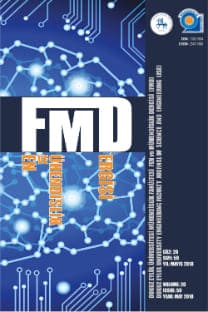FERMENTASYONLA ETİL ALKOL ÜRETİMİ ÜZERİNE ÇÖZÜCÜ ETKİSİ
Endüstride fermantasyon ile etil alkol üretiminin büyük bir kısmı kesikli proseslerde gerçekleştirilmektedir. Kesikli fermantasyonda son ürün inhibisyonu nedeniyle seyreltik ürün elde edilmektedir. Son yıllarda, seyreltik etil alkol çözeltisinin saflaştırılması üzerine araştırmalar artmıştır. Alternatif ayırma metotlarından biri de sıvı-sıvı ekstraksiyon prosesleridir. Sıvı–sıvı ekstraksiyon proseslerinde en önemli parametrelerden biri çözücünün mayalar ve fermantasyon üzerine etkisidir. Bu çalışmada, çözücü olarak seçilen oleil alkolün mayaların ve fermantasyon üzerinde inhibisyon etkisinin olmadığı belirlenmiştir. Oleil alkolün mayalar (Saccharomyces cerevisiae) için yaşamsal uygunlukta bir çözücü olduğu saptanmıştır. Su+Etil alkol+Oleil alkol üçlü sisteminin çözünürlük eğrisi fermantasyon sıcaklığında (303±0.2 K) incelenmiştir. Etil alkolün oleil alkol içindeki dağılma katsayısı deneysel olarak ölçülmüştür
Anahtar Kelimeler:
Etil alkol, Saccharomyces cerevisiae, Fermantasyon, Ekstraksiyon
THE EFFECT OF SOLVENT ON A ETHANOL FERMENTATION PROCESS
The most used method for production of ethyl alcohol is batch fermentation process. In the batch fermentation, a diluted product is obtained because of inhibition of the last product. In recent years, the studies concerning purification of the dilute ethyl alcohol has increased. One of the alternative methods is liquid-liquid extraction process. It was determined that oleil alcohol has not negative effect on the yeast (Saccharomyces cerevisiae) and fermentation. Oleil alcohol is a biocompatible extractant for ethyl alcohol. Experimental liquid-liquid equilibrium of Water+Ethyl alcohol+Oleil alcohol system was examined at 303±0.2 K. The distribution coefficient of ethyl alcohol in the oleil alcohol was measured at 303±0.2 K
Keywords:
Ethyl alcohol, Saccharomyces cerevisiae, Fermentation, Extraction,
___
- Arenson D.R., Kertes A.S., King C. J., (1990): “Extraction of Ethanol from Aqueous Solution with Phenolic Extractants”, Ind. Eng. Chem. Res., V. 29, p. 607-613.
- Dubois M., Gilles K.A., Hamilton J.K., Rebers P.A., Smith F., (1956): “Colorimetric Method for Determination of Sugars and Related Substances”, Analytical Chemistry, V. 28, p. 350-356.
- Gürgün V., Halkman A.K., ( 1990): “Mikrobiyolojide Sayım Yöntemleri”, Gıda Teknolojisi Yayın Derneği, Ankara.
- Jassal D.S., Zhang Z., Hill G.A., (1994): “In-situ Extraction and Purification of Ethanol Using Commercial Oleic Acid”, The Canadian Journal of Chemical Engineering, V.72, p. 822- 826.
- Kapucu H., Mehmetoğlu Ü., (1996): “Ekstraktif Etil alkol Fermentasyonunda Çözücü Seçimi”, İstanbul Teknik Üniversitesi, II. Ulusal Kimya Mühendisliği Kongresi, İstanbul, Türkiye, s.257-263.
- Kida K., Kume K., Morimura S., Sonoda Y., (1992): “Repeated-Batch Fermentation Process Using a Thermotolerant Flocculating Yeast Constructed by Protoplast Fusion”, Journal of Fermentation and Bioengineering, V.74, N. 3, p.169-173.
- Lee J., (1992). “Biochemical Engineering”, Prentice Hall, New Jersey.
- Letcher T.M., Bricknell B.C., (1994): “Liquid-liquid Equilibria for Mixture of an Alkanol+Hept-ene+Water at 25 °C”, J.Chem. Eng. Data, V.39, N.2, p.320-323.
- Miner M., Goma G., (1982): “Ethanol Production by Extractive Fermentation”, Biotechnology and Bioengineering, V. 24, p. 1565-1579.
- Nagodawithana T.W., Castellano C., Steinkraus K.H., (1974): “Effect of Dissolved Oxygen, Temperature, Initial Cell Count, and Sugar Concentration on the Viability of Saccharomyces cerevisiae in Rapid Fermentation”, Applied Microbiology, V. 28 No.3, p. 383-391.
- Roddy J.W., (1981): “Distribution of Ethanol-Water Mixtures to Organic Liquids”, Ind. Eng. Chem. Process Des. Dev., V. 20, No.1, p.104-108.
- Rose A., (1976): “Chemical Microbiology”, Planum Press, New York.
- Sola C., Casas C., Godia F., Poch, Serra A., ( 1986): “Continuous Ethanol Production by Immobilised Yeast Cells and Ethanol Recovery by Liquid-Liquid Extraction”, Biotechnology and Bioengineering Symp, P. 519-524.
- Vega J.L, O’Maley D.J., Clausen E.C., Gaddy J.L., (1985): “Generalised Characteristics of a Cross-Linked Immobilised Cell Reactor for Ethanol Production”, Biotechnology and Bioengineering Symp., No.15, p. 263-276.
- Zhang Z., Hill G.A., ( 1991): “Ternary Liquid-Liquid Equilibria of Water”, Ethanol and Oleic Acid, J. Chem. Eng. Data, V.36, p.453-456.
- ISSN: 1302-9304
- Yayın Aralığı: Yılda 3 Sayı
- Başlangıç: 1999
- Yayıncı: Dokuz Eylül Üniversitesi Mühendislik Fakültesi
Sayıdaki Diğer Makaleler
Korualan ve Bağbaşı (Hadim-Konya) arasındaki bölgenin yapısal özellikleri
POLİETİLEN VE POLİPROPİLENİN MEKANİK ÖZELLİKLERİNİN İNCELEMESİ
Ö. VATAN, İ. M. HASDEMİR, İ. İNCİ, M. BİLGİN, A. AYDIN
KORUALAN VE BAĞBAŞI (HADİM-KONYA) ARASINDAKİ BÖLGENİN YAPISAL ÖZELLİKLERİ
YUKARI AKIŞLI ANAEROBİK FİLTRE MODEL REAKTÖRÜNDE TEMİZ YATAK HİDROLİK ÖZELLİKLERİN BELİRLENMESİ
Ö VATAN, İ M HASDEMİR, İ İNCİ, M BİLGİN, A AYDIN
İNDİGO BOYAR MADDELERİNİN ANAEROBİK ARITILABİLİRLİKLERİNİN İNCELENMESİ
Delya SPONZA, Mustafa IŞIK, Hülya ATALAY
Cowan M3 dağılımının trafik akımlarının modellenmesinde kullanımı
SERHAN TANYEL, Çetin VARLIORPAK
COWAN M3 DAĞILIMININ TRAFİK AKIMLARININ MODELLENMESİNDE KULLANIMI
